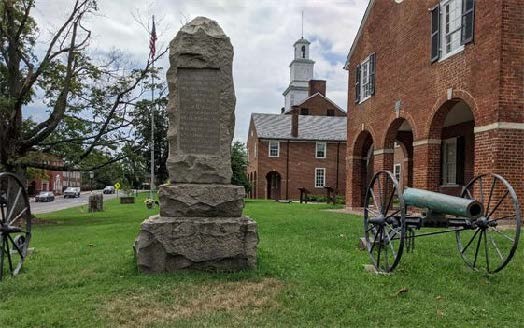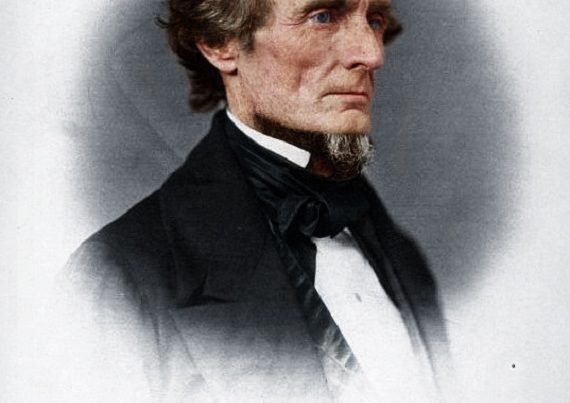Editor’s note: Delivered by Congressman John Warwick Daniel at the dedication to the Confederate monument at the Fairfax County, Virginia courthouse October 1, 1890. The monument stood on the courthouse square “upon Fairfax soil” on a lot purchased so the “grassy mound at the base of this monument now covers the remains of two hundred heroes.” Funds were collected in “memory of the Confederate dead.”
MR. CHAIRMAN, COMRADES, LADIES AND GENTLEMEN :
Not long ago General Early addressed me a letter, and in doing so he used the same kind expression as the chair did in his flattering introduction, that the proudest distinction I have ever known, and the grandest title any of us have ever worn, is that of Confederate soldier; for there is no story of fame, no dream of glory, nor grander evidence of true manhood than doing simple duty, which those brave boys, a few of whom you have met here to-day to honor, did, I was about to say upon a hundred battle-fields. In the face of a bitter contest they stood firm, and when those fearful odds pressed them back for the last time they were yet the grandest people that ever knew defeat, that are destined forever to be free.
I come not to recount the story of their just fame. I would that I could add one word that would perpetuate and enshrine their memo- ries that future generations may read them as we to-day do the stories of Putnam, Washington, and Light-Horse Harry Lee. We want the rising generation to know from what gallant loins they came. That the cause makes all, and that it alone honors or degrades in the fall ; and these brave soldiers did nothing which neither you nor I need be ashamed. They did their simple duty, as old Early said, and have not apologized for it since.
Did there ever stand upon the battle-field an army of such people ? There in those ranks you would have seen the young student of the ministry, touching elbows with the blacksmith, the rich man’s son and his poor neighbor’s plow-boy side by side all bent upon their course of duty.
I have heard it said that we were an aristocracy that dominated the South. My countrymen, of no people was this statement less true. It is a mistake to attribute the war to the politicians. The forces that brought it about had long been boiling and there was no exit except by the sword.
If the war of 1861 was a mistake, then was the war of 1776 a mistake. In both we were confronted by similar problems, requiring a similar solution; and the forces of both were nearly a century old before they were set in motion. In the Constitution of the United States had the institution of slavery its corner-stone ; and the fugitive slave law, which the North openly violated, had its birth nearly a century before in .New England, where the first assertion of State rights was made ; and where the South urged, in the interest of the entire country, the right of local self-government bequeathed to them the priceless heritage of their fathers these people denied it.
It is not my purpose on this occasion to enter upon a disquisition on the right of secession or its obverse. This is not the question before us to-day ; but I do say that history knows no grander page to its heroes, nor memory rears no prouder stone to its loved ones than the story of those brave boys. That a great revolution did exist is the best evidence that man can give of the right of that page to be there, and for yonder stone to mark their quiet graves.
What scene have some of you witnessed! I would not to-day go over those hard-fought fields recount the brave deeds that were done. How those ragged lines wavered not to fall, but to valiantly press to the front, as they did when they looked down the muzzle of Hancock’s gun. Late at Seven Pines did brave men do fearful duty.
But, oh, there was a time, my countrymen, when you saw suddenly, like a shooting star that invincible, incomparable Jackson wheel round on the enemy’s right flank, and then something terrible happened!
It is true the Confederacy fell, but it did great service to the military world. Success is not altogether a mortal achievement. Man cannot know the purpose of God in defeat. There may be a destiny yet unknown to all, the first workings of which may have only taken shape at the dread field of Appomattox. I believe that all great battles are fought beyond the stars.
I am not one to despair. Wars and defeats precede all great achievements and successes. When the wild Goths and Vandals poured down upon Rome and her arts, and civilization seemed almost blotted out forever, the true Roman spirit arose grander than ever, and from that wreck of former glory arose the renaissance. Here in the South have we been tried in the school of adversity, and destiny has not spared the rod. For my own part, I felt at the close of the war that there was nothing left here in old Virginia for John, so I concluded to take Horace Greely’s advice, ” Go West.” I did so. I went out to St. Louis, Kansas City and Chicago, but everywhere I went I felt so terribly lonesome. I had gotten out of my latitude, and I just broke out in that ,old strain, ” Oh carry me back to old Virginia,” where the ragged boys were that I loved ; and sink or swim, live or die, I am going to stay right here with you all. I thank God that I have done so, for I have builded better than I know, and all I am and all I hope to be I owe to these dear people of old Virginia.
Ladies and gentlemen, I beg to assure you that I most profoundly appreciate the honor to which, your courtesy has invited me. I bring no gaudy flower to lay upon the monument your noble hearts have placed upon consecrated ground.
It stands like a sentinel of your love pointing heavenward, simple, grand, and beautiful as the story of their lives. As Macaulay has so fittingly said :
“To every man upon this earth
Death cometh soon or late ;
And how can men die better
Than facing fearful odds
For the ashes of his fathers
And the temples of his gods.”
I have not spoken of the brave leaders who led those valiant men. Never was a valiant army more valiantly led. One reason why their few numbers stood so well against the many was that Lee and Jack- son and Stuart knew their men. They were like deft masters who knew the keys of their instruments and touched responsive chords.
Before closing this slight tribute I want to add my criticism upon what I conceive to have been the greatest battle ever fought. I refer to the battle of Chancellorsville a battle waged against all the known rules of war. Forty-five thousand men, weary, poorly clothed, and even worse fed, holding their own against Joe Hooker’s one hundred and twenty thousand, ” the finest army upon this planet,” as he was wont to call it. Hooker had planned the campaign, and he knew he had the forces. What more ? He telegraphed to Washington that he would “bag ’em, this time.” He went out and reconnoitred: he could station all the Confederate leaders but Jackson. Where was Jackson ? Away off from an unexpected quarter came a dull heavy boom nearer and nearer. Hooker’s men could not stand it. Great God ! There was Jackson, as Fitz Lee would say, singing, ” Old Joe Hooker can’t you come out to-night?” But Hooker did not want to come that way. Then came the terrible fall, when the Confederacy heard its own requiem in the funeral dirge of the great Jackson ; but Lee, that incomparable chieftian, pressed on with one division around thirteen hundred men ; old Jeb Stuart rushed on, and terrible was the story to tell. Think of Robert E. Lee with one division playing against the whole Federal army, and you will know something of this great military feat. Lee was a great man, truly great, modest, unassuming, noble, brave ; but I cannot pause to tell the story of his life ; it would need greater eloquence than mine that man without a peer.
They call Kentucky “the dark and bloody ground”; but, my comrades, old Northern Virginia is dark and bloody ground. All her soil has been consecrated. That modest gentleman here (pointing to General Hunton) gave those fellows a trip across the Potomac near Leesburg. That night-hawk, Mosby, swept around, startling whole regiments with his little band of gallant followers. Near here fell John Q. Marr, among the first who bit the dust. Terrible, indeed, as this has been to us of the South, out of it has come good ; as the war brought out and developed the manhood of her people, so now will other developments come.
I am reminded of the beautiful dream of the Italian. A fairy presented him with a land of sunshine, beautiful flowers, clear and spark- ling waters. Then were fountains at every hand. He passed on slowly, noticing the changes as he followed the limpid streams towards their source. At every turn the land became more rugged, flowers less abundant until he reached the cold, rocky, snow- clad Alps themselves. So will the South find the sources of her new life in the fearful storms through which her heroic sons and daughters have passed. And of these fair daughters has history yet to pen its just tribute. To them 1 bow, for my tongue is insufficient to the task. The women of the South were the genius that inspired her sons to valor. These noble Spartan women sent their boys forth with true lessons learned at the knee sent them forth with bread in their knapsacks and mother’s Bible to keep them true.
‘Twas the mothers of this fair Southland it was her sisters and wives and other dear ones whose loving faces kept bright the honor and deeds of her men.
God bless you women of Virginia and of the South! The memory of thy brave boys who have passed on have just tribute in such keeping as yours.







Brings a tear to the eye. Very well said, an excellent tribute to our southern heroes. And he is right…the ladies of the south played an incredible role in the bravery of our confederate dead.
God bless them all. So grateful and proud to be a descendant of more than 30 brave confederate soldiers of Tar Heel and Palmetto State fame. Some of them gave the ultimate price. Outnumbered, out supplied and never waivered. And, I will forever tell their story and keep their memory alive.
What a blessing from God to stand in the shadow of such honorable Americans, their blood coursing through your veins. DEO VINDICE
An absolutely lovely tribute. What a joy to read. Thanks!